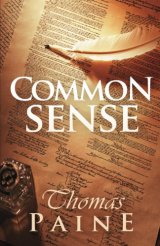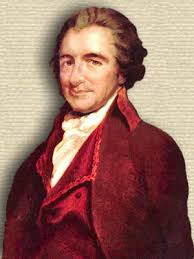Common Sense Page #9
Common Sense is a pamphlet written by Thomas Paine in 1775–1776 advocating independence from Great Britain to people in the Thirteen Colonies. Writing in clear and persuasive prose, Paine marshaled moral and political arguments to encourage common people in the Colonies to fight for egalitarian government.
But the king you will say has a negative in England; the people there can make no laws without his consent. In point of right and good order, there is something very ridiculous, that a youth of twenty-one (which hath often happened) shall say to several millions of people, older and wiser than himself, I forbid this or that act of yours to be law. But in this place I decline this sort of reply, though I will never cease to expose the absurdity of it, and only answer, that England being the King's residence, and America not so, makes quite another case. The king's negative here is ten times more dangerous and fatal than it can be in England, for there he will scarcely refuse his consent to a bill for putting England into as strong a state of defence as possible, and in America he would never suffer such a bill to be passed. America is only a secondary object in the system of British politics, England consults the good of this country, no farther than it answers her own purpose. Wherefore, her own interest leads her to suppress the growth of ours in every case which doth not promote her advantage, or in the least interferes with it. A pretty state we should soon be in under such a second-hand government, considering what has happened! Men do not change from enemies to friends by the alteration of a name: And in order to shew that reconciliation now is a dangerous doctrine, I affirm, that it would be policy in the king at this time, to repeal the acts for the sake of reinstating himself in the government of the provinces; in order, that he may accomplish by craft and subtilty, in the long run, what he cannot do by force and violence in the short one. Reconciliation and ruin are nearly related. Secondly. That as even the best terms, which we can expect to obtain, can amount to no more than a temporary expedient, or a kind of government by guardianship, which can last no longer than till the colonies come of age, so the general face and state of things, in the interim, will be unsettled and unpromising. Emigrants of property will not choose to come to a country whose form of government hangs but by a thread, and who is every day tottering on the brink of commotion and disturbance; and numbers of the present inhabitants would lay hold of the interval, to dispense of their effects, and quit the continent. But the most powerful of all arguments, is, that nothing but independance, i.e. a continental form of government, can keep the peace of the continent and preserve it inviolate from civil wars. I dread the event of a reconciliation with Britain now, as it is more than probable, that it will be followed by a revolt somewhere or other, the consequences of which may be far more fatal than all the malice of Britain. Thousands are already ruined by British barbarity; (thousands more will probably suffer the same fate) Those men have other feelings than us who have nothing suffered. All they now possess is liberty, what they before enjoyed is sacrificed to its service, and having nothing more to lose, they disdain submission. Besides, the general temper of the colonies, towards a British government, will be like that of a youth, who is nearly out of his time; they will care very little about her. And a government which cannot preserve the peace, is no government at all, and in that case we pay our money for nothing; and pray what is it that Britain can do, whose power will be wholly on paper, should a civil tumult break out the very day after reconciliation? I have heard some men say, many of whom I believe spoke without thinking, that they dreaded an independance, fearing that it would produce civil wars. It is but seldom that our first thoughts are truly correct, and that is the case here; for there are ten times more to dread from a patched up connexion than from independance. I make the sufferers case my own, and I protest, that were I driven from house and home, my property destroyed, and my circumstances ruined, that as man, sensible of injuries, I could never relish the doctrine of reconciliation, or consider myself bound thereby. The colonies have manifested such a spirit of good order and obedience to continental government, as is sufficient to make every reasonable person easy and happy on that head. No man can assign the least pretence for his fears, on any other grounds, than such as are truly childish and ridiculous, viz. that one colony will be striving for superiority over another. Where there are no distinctions there can be no superiority, perfect equality affords no temptation. The republics of Europe are all (and we may say always) in peace. Holland and Swisserland are without wars, foreign or domestic: Monarchical governments, it is true, are never long at rest; the crown itself is a temptation to enterprizing ruffians at home; and that degree of pride and insolence ever attendant on regal authority, swells into a rupture with foreign powers, in instances, where a republican government, by being formed on more natural principles, would negociate the mistake. If there is any true cause of fear respecting independance, it is because no plan is yet laid down. Men do not see their way out-- Wherefore, as an opening into that business, I offer the following hints; at the same time modestly affirming, that I have no other opinion of them myself, than that they may be the means of giving rise to something better. Could the straggling thoughts of individuals be collected, they would frequently form materials for wise and able men to improve into useful matter. Let the assemblies be annual, with a President only. The representation more equal. Their business wholly domestic, and subject to the authority of a Continental Congress. Let each colony be divided into six, eight, or ten, convenient districts, each district to send a proper number of delegates to Congress, so that each colony send at least thirty. The whole number in Congress will be at least 390. Each Congress to sit and to choose a president by the following method. When the delegates are met, let a colony be taken from the whole thirteen colonies by lot, after which, let the whole Congress choose (by ballot) a president from out of the delegates of that province. In the next Congress, let a colony be taken by lot from twelve only, omitting that colony from which the president was taken in the former Congress, and so proceeding on till the whole thirteen shall have had their proper rotation. And in order that nothing may pass into a law but what is satisfactorily just, not less than three fifths of the Congress to be called a majority.--He that will promote discord, under a government so equally formed as this, would have joined Lucifer in his revolt.
Translation
Translate and read this book in other languages:
Select another language:
- - Select -
- 简体中文 (Chinese - Simplified)
- 繁體中文 (Chinese - Traditional)
- Español (Spanish)
- Esperanto (Esperanto)
- 日本語 (Japanese)
- Português (Portuguese)
- Deutsch (German)
- العربية (Arabic)
- Français (French)
- Русский (Russian)
- ಕನ್ನಡ (Kannada)
- 한국어 (Korean)
- עברית (Hebrew)
- Gaeilge (Irish)
- Українська (Ukrainian)
- اردو (Urdu)
- Magyar (Hungarian)
- मानक हिन्दी (Hindi)
- Indonesia (Indonesian)
- Italiano (Italian)
- தமிழ் (Tamil)
- Türkçe (Turkish)
- తెలుగు (Telugu)
- ภาษาไทย (Thai)
- Tiếng Việt (Vietnamese)
- Čeština (Czech)
- Polski (Polish)
- Bahasa Indonesia (Indonesian)
- Românește (Romanian)
- Nederlands (Dutch)
- Ελληνικά (Greek)
- Latinum (Latin)
- Svenska (Swedish)
- Dansk (Danish)
- Suomi (Finnish)
- فارسی (Persian)
- ייִדיש (Yiddish)
- հայերեն (Armenian)
- Norsk (Norwegian)
- English (English)
Citation
Use the citation below to add this book to your bibliography:
Style:MLAChicagoAPA
"Common Sense Books." Literature.com. STANDS4 LLC, 2024. Web. 25 Nov. 2024. <https://www.literature.com/book/common_sense_270>.




Discuss this Common Sense book with the community:
Report Comment
We're doing our best to make sure our content is useful, accurate and safe.
If by any chance you spot an inappropriate comment while navigating through our website please use this form to let us know, and we'll take care of it shortly.
Attachment
You need to be logged in to favorite.
Log In